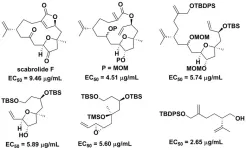New survey from NCCN finds cancer drug shortage management remains a moving target, impacting clinical trials
Specific carboplatin and cisplatin shortages fell to 11% and 7% respectively, but 89% of centers surveyed continue to report shortages for at least one type of systemic therapy; 75% are experiencing two or more drug shortages
2024-06-26
(Press-News.org) PLYMOUTH MEETING, PA [June 26, 2024] — The National Comprehensive Cancer Network® (NCCN®)—a nonprofit alliance of leading cancer centers—is publishing new results for its latest survey on cancer drug shortages in the United States. This follows data published one year ago, and six months ago, illustrating how up to 93% of centers surveyed were experiencing shortages of the crucial chemotherapy carboplatin at its peak. In June 2023, 70% of centers surveyed were also lacking adequate supply for cisplatin. In the latest survey, only 11% of surveyed centers reported a shortage of carboplatin and 7% for cisplatin; but new concerns have emerged.
“Critical drug shortages were not a new problem last year and they continue to be a problem now,” explained Crystal S. Denlinger, MD, Chief Executive Officer, NCCN. “The dual carboplatin and cisplatin shortage was particularly severe, and we were able to help sound the alarm during its peak. Despite a renewed attention to drug shortages over the past year, 89% of the responding centers in the latest survey are still reporting shortages of various important anti-cancer agents and supportive care medications. Most of them are still managing shortages for more than one type of medication right now. These shortages not only put a burden on patients, caregivers, and providers, but they could also delay vital clinical trials and slow the pace of progress for new cancer therapies.”
According to the latest survey results—fielded May 28 through June 11, 2024—of the 28 responding centers, 57% reported a shortage of vinblastine, 46% for etoposide, and 43% for topotecan. Some level of shortage was found for many other chemotherapies and supportive care medications, including dacarbazine, 5-fluorouracil, methotrexate, and others. Many of these drugs form the backbones of effective multi-agent regimens across both curative and palliative treatment settings.
The ongoing drug shortages were also found to affect clinical trials at 43% of centers by impacting budgeting, enrollment, and raising administrative burden. 27% reported treatment delays due to shortage-related changes that required additional prior authorization. The responding centers continue to mitigate the impact of shortages through a combination of strategies, including waste reduction management plus adjusted timing and dosage within evidence-based ranges.
“The current situation underscores the need for sustainable, long-term solutions that ensure a stable supply of high-quality cancer medications,” said Alyssa Schatz, MSW, Senior Director of Policy & Advocacy, NCCN. “The federal government has a key role to play in addressing this issue. Establishing economic incentives, such as tax breaks or manufacturing grants for generic drugmakers, will help support a robust and resilient supply chain—ultimately safeguarding care for people with cancer across the country.”
Respondents noted concerns about how the current marketplace incentivizes unsustainable practices, with 75% stating they would like to see economic incentives put in place to encourage the high-quality manufacturing of medications, especially generic versions that are often in short supply. 64% felt there was a need for a broader buffer stock payment. The same percentage would like to see more information made available on user experience for various suppliers.
The NCCN Policy and Advocacy team has been involved with national efforts, working with federal regulators, agencies, and lawmakers to implement long-term solutions to drug shortages. Learn more and view past and present survey results by visiting NCCN.org/drug-shortages.
# # #
About the National Comprehensive Cancer Network
The National Comprehensive Cancer Network® (NCCN®) is a not-for-profit alliance of leading cancer centers devoted to patient care, research, and education. NCCN is dedicated to improving and facilitating quality, effective, equitable, and accessible cancer care so all patients can live better lives. The NCCN Clinical Practice Guidelines in Oncology (NCCN Guidelines®) provide transparent, evidence-based, expert consensus recommendations for cancer treatment, prevention, and supportive services; they are the recognized standard for clinical direction and policy in cancer management and the most thorough and frequently-updated clinical practice guidelines available in any area of medicine. The NCCN Guidelines for Patients® provide expert cancer treatment information to inform and empower patients and caregivers, through support from the NCCN Foundation®. NCCN also advances continuing education, global initiatives, policy, and research collaboration and publication in oncology. Visit NCCN.org for more information.
END
ELSE PRESS RELEASES FROM THIS DATE:
2024-06-26
Highlights:
Bovine mastitis is a potentially fatal condition with myriad known causes, including bacteria.
Biting flies may help cause mastitis, but the mechanisms are not well elucidated.
Researchers characterized microbial diversity in biting flies and manure to look for connections.
The flies carried relevant bacterial strains, also found in the manure, associated with mastitis.
The research may point to new strategies for protecting cows from disease-causing pathogens.
Washington, D.C.—Bovine mastitis, which affects cows, leads to reduced milk production and can be fatal if left untreated. The USDA National Animal Health Monitoring ...
2024-06-26
Balance can be impacted by various factors, including diseases such as Parkinson’s disease, acute and chronic injuries to the nervous system, and the natural aging process. Accurately assessing balance in patients is important to identify and manage conditions that affect coordination and stability. Balance assessments also play a key role in preventing falls, understanding movement disorders, and designing appropriate therapeutic interventions across age groups and medical conditions.
However, traditional methods used to assess balance often suffer from subjectivity, are not comprehensive enough and cannot be administered remotely. Moreover, these assessments rely on expensive, ...
2024-06-26
Stars blinking code in Netflix’s “3 Body Problem” might be science fiction, but by deciphering neutron stars’ erratic flickers, a new study has revealed the twisted origin of these dead stars’ mysterious “heartbeats.”
When neutron stars—ultra-dense remnants of massive stars that exploded in supernovae—were first discovered in 1967, astronomers thought their strange periodic pulses could be signals from an alien civilization. Although we now know these “heartbeats” ...
2024-06-26
Many municipal landfills “burp” gas from decomposing organic matter rather than letting it build up. And burps from buried waste containing per- and polyfluoroalkyl substances (PFAS) can release these “forever chemicals” into the air, say researchers in ACS’ Environmental Science & Technology Letters. Their study reports unexpectedly high levels of airborne PFAS at three landfills and demonstrates that vented gases and liquid by-products called leachates could transport similar amounts of these contaminants to the environment.
Some consumer products and commercial waste, such as children’s clothing, cosmetics and wastewater treatment sludge solids, contain ...
2024-06-26
Clean, safe water is a limited resource and access to it depends on local bodies of water. But even dry regions have some water vapor in the air. To harvest small amounts of humidity, researchers in ACS Energy Letters have developed a compact device with absorbent-coated fins that first trap moisture and then generate potable water when heated. They say the prototype could help meet growing demands for water, especially in arid locations.
Earth’s atmosphere holds trillions of liters of fresh water as vapor, but it’s challenging to collect this colorless, transparent and dilute gas. Previously, researchers developed systems that trap ...
2024-06-26
Comprising the base of the food web, plankton are extremely important to marine ecosystems. However, there is still much to be discovered about these organisms, and that’s especially true for mixoplankton.
Plankton are typically divided into two groups. Similar to plants, phytoplankton contain chlorophyll and derive energy from photosynthesis. Zooplankton, on the other hand, consume other organisms for their energy. However, there is also a third group, mixoplankton, that is a combination of the two. And, despite accounting for, at times, more than half of all plankton in the ocean, they remain ...
2024-06-26
River plants provide ecological and environmental benefits, but they raise flood risk by blocking the flow during heavy rain. Removing woody riparian vegetation patches is a primary flood prevention method, but it threatens stream's biodiversity. The research team at the Korea Institute of Civil Engineering and Building Technology (KICT, President Kim, Byung-Suk) has developed a technology for quantifying the effect of river vegetation patches on flood level changes to aid in better decision-making of river management for balancing ecological benefits and flood mitigation.
Rivers ...
2024-06-26
Marine organisms produce many organic compounds with diverse chemical structures and biological activities. These natural marine products are regarded as potential starting points for the discovery and development of new drugs. Among these are norcembranolide diterpenes isolated from the soft corals of the genus Sinularia. These compounds exhibit diverse biological activities, and many of them have anti-cancer and anti-inflammatory properties. Consequently, many studies have investigated the properties of norcembranolide diterpenes and their synthesis methods. Given their potential in drug discovery, developing a synthetic ...
2024-06-26
JACKSONVILLE, Florida — The blood-brain barrier — a network of blood vessels and tissues that nurtures and protects the brain from harmful substances circulating in the blood — is disrupted in Alzheimer's disease. Now, researchers at Mayo Clinic and collaborators have uncovered unique molecular signatures of blood-brain barrier dysfunction that could point to new ways to diagnose and treat the disease. Their findings are published in Nature Communications.
"These signatures have high potential to become novel biomarkers that capture brain changes in Alzheimer's ...
2024-06-26
Rome - Rural livelihoods are quite intertwined with urban centers, with mid-sized cities playing an extraordinary role in providing required services, including for food security, agricultural livelihoods and viable rural development, according to a new study by researchers at the Food and Agriculture Organization of the United Nations (FAO) and other institutions.
Some two-thirds of the world’s population, or more than 5 billion people, live within one hour of travel time – using locally available means of ...
LAST 30 PRESS RELEASES:
[Press-News.org] New survey from NCCN finds cancer drug shortage management remains a moving target, impacting clinical trials
Specific carboplatin and cisplatin shortages fell to 11% and 7% respectively, but 89% of centers surveyed continue to report shortages for at least one type of systemic therapy; 75% are experiencing two or more drug shortages







